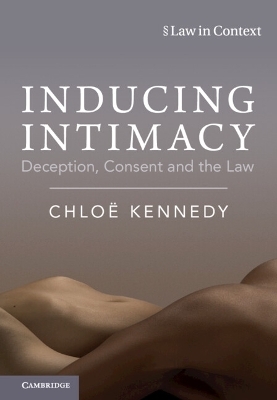
Inducing Intimacy
Deception, Consent and the Law
Seiten
2024
Cambridge University Press (Verlag)
978-1-009-36110-1 (ISBN)
Cambridge University Press (Verlag)
978-1-009-36110-1 (ISBN)
This book will interest lawyers and historians who want to learn about legal responses to sex and sexual/romantic relationships which have been induced by deception. It shows how a range of civil and criminal laws have been used in this context and offers insights into whether and why the law should be used in this way today.
Kennedy presents a new way of evaluating the regulation of deceptively induced intimacy, that is, sex and sexual/romantic relationships, on the basis of an innovative genealogy of legal responses to this conduct. This book traces the development of a range of civil and criminal laws across c. 250 years, showing how using deception to induce intimacy has been legally understood, compensated and punished. It offers an original interpretation of the form and function of these laws by situating them in their social and cultural contexts. It argues that prevailing notions of what makes intimacy valuable, including the role it plays in self-construction, have shaped and constrained the laws' operation. It shows how deceptively induced sex has come to be treated more seriously while the opposite is true of deceptively induced relationships and concludes by presenting a new framework for deciding whether and when deceptively induced intimacy should be regulated by law today.
Kennedy presents a new way of evaluating the regulation of deceptively induced intimacy, that is, sex and sexual/romantic relationships, on the basis of an innovative genealogy of legal responses to this conduct. This book traces the development of a range of civil and criminal laws across c. 250 years, showing how using deception to induce intimacy has been legally understood, compensated and punished. It offers an original interpretation of the form and function of these laws by situating them in their social and cultural contexts. It argues that prevailing notions of what makes intimacy valuable, including the role it plays in self-construction, have shaped and constrained the laws' operation. It shows how deceptively induced sex has come to be treated more seriously while the opposite is true of deceptively induced relationships and concludes by presenting a new framework for deciding whether and when deceptively induced intimacy should be regulated by law today.
Chloë Kennedy is Professor of Law and History at the School of Law, University of Edinburgh. She has published widely in the areas of criminal law, legal history, legal theory, and law and gender. She is the co-editor of two books – Scottish Feminist Judgments: (Re)Creating Law from the Outside In (Hart, 2019) and Leading Works in Criminal Law (Routledge, 2023). Inducing Intimacy: Deception, Consent and the Law is the product of a research fellowship Chloë was awarded by the Arts and Humanities Research Council.
1. Inducing intimacy: an introduction; Part I. Marriage: 2. Making Marriage; 3. Promising Marriage; 4. Faking Marriage; Part II. Sex: 5. Eliciting Sex; 6. Procuring Sex; 7. Imposing Sex; 8. Inducing intimacy: a conclusion.
| Erscheinungsdatum | 29.10.2024 |
|---|---|
| Reihe/Serie | Law in Context |
| Zusatzinfo | Worked examples or Exercises |
| Verlagsort | Cambridge |
| Sprache | englisch |
| Maße | 170 x 244 mm |
| Gewicht | 668 g |
| Themenwelt | Recht / Steuern ► Allgemeines / Lexika |
| Recht / Steuern ► EU / Internationales Recht | |
| Recht / Steuern ► Strafrecht ► Besonderes Strafrecht | |
| Sozialwissenschaften ► Soziologie ► Gender Studies | |
| ISBN-10 | 1-009-36110-4 / 1009361104 |
| ISBN-13 | 978-1-009-36110-1 / 9781009361101 |
| Zustand | Neuware |
| Informationen gemäß Produktsicherheitsverordnung (GPSR) | |
| Haben Sie eine Frage zum Produkt? |
Mehr entdecken
aus dem Bereich
aus dem Bereich
Delikte gegen die Person und die Allgemeinheit
Buch | Softcover (2023)
C.F. Müller (Verlag)
27,00 €
BtMVV, KCanG, MedCanG, AMG, TAMG, NpSG, AntiDopG, GÜG
Buch | Hardcover (2024)
C.H.Beck (Verlag)
149,00 €


